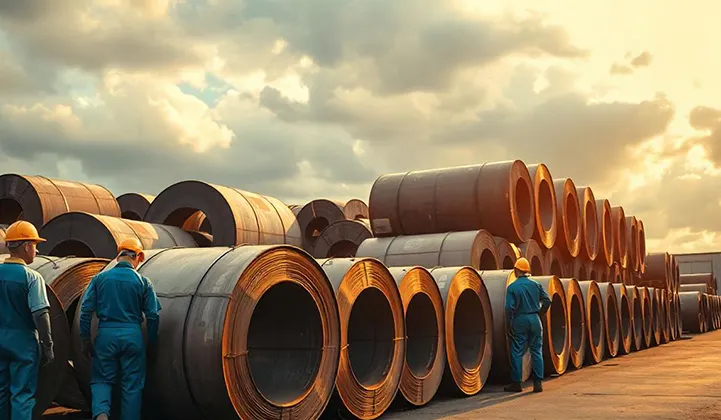Choosing the right steel coil is crucial for industries like automotive, construction, and manufacturing, where product quality and durability directly impact performance and safety. However, with various grades, finishes, and specifications available, evaluating high-quality steel coils can be challenging. This article provides practical tips to help you assess and select the right steel coil for your industry’s needs, ensuring optimal performance and cost-effectiveness.
1. Determine the Appropriate Grade for Your Application
Steel coils are available in numerous grades, each with unique properties suited for specific applications. Carbon steel coils are common in construction due to their strength and affordability, while stainless steel coils are preferred in industries requiring high corrosion resistance, such as food processing and medical equipment. The high-strength, low-alloy (HSLA) steel is ideal for automotive applications, where lightweight and durable materials are essential.
When evaluating steel coil grades, consider the specific requirements of your application:
- Mechanical properties: Strength, flexibility, and resistance to deformation.
- Environmental conditions: Corrosion resistance for outdoor or marine applications.
- End-use performance: Durability for high-stress applications like automotive frames.
Understanding the grade requirements will ensure that the selected steel coil performs as expected in your operating conditions.
2. Assess Surface Finish and Coating for Corrosion Resistance
For applications exposed to moisture or harsh environments, choosing the right surface finish and coating is crucial to prevent corrosion. Galvanized coatings are commonly used for outdoor applications due to their rust resistance, achieved by dipping steel in molten zinc. Other options include electrogalvanization for a thinner, uniform coating, and epoxy or powder coatings that add a durable, colored layer.
Key considerations when evaluating finish and coating:
- Corrosion resistance: Choose a coating based on the environmental exposure and duration.
- Aesthetic needs: Coatings can also enhance the visual appeal, which is important in consumer-facing industries.
- Maintenance requirements: Coatings like powder and epoxy may require occasional touch-ups, while galvanization offers long-term protection with minimal upkeep.
Matching the coating type to your specific needs ensures the steel coil’s durability and helps manage maintenance costs over time.
3. Verify Thickness and Tolerances to Ensure Dimensional Accuracy
The thickness of steel coils impacts both weight and strength, so it’s essential to specify an appropriate thickness range for your application. Most high-quality manufacturers provide tight tolerances on thickness, ensuring consistency throughout the coil, which is important for industries like automotive and construction, where precision is key.
Ask your supplier about their quality control processes for measuring thickness and check whether they adhere to standardized tolerance limits:
- High-precision tolerance: Consistent thickness ensures uniformity, reducing defects and potential delays.
- Certifications: Look for adherence to ISO standards or other recognized certifications that demonstrate a commitment to quality.
Ensuring dimensional accuracy in thickness and tolerance helps improve reliability in applications where even small variations can impact performance and safety.
4. Review Mechanical and Chemical Properties for Compatibility
High-quality steel coils should possess the mechanical and chemical properties necessary for your application. Mechanical properties include tensile strength, yield strength, and elongation, while chemical properties refer to the steel’s composition, including elements like carbon, manganese, and chromium.
Evaluating these properties based on your requirements:
- Tensile strength and yield strength: Choose coils with appropriate strength for load-bearing applications.
- Chemical composition: Verify that the steel’s alloy mix is compatible with your industry standards for durability and resistance to environmental factors.
- Elongation: Important for applications needing flexibility without breaking, such as in automotive and appliance manufacturing.
High-quality suppliers will provide you with material data sheets detailing these properties, allowing you to ensure the steel coil meets your specific technical needs.
5. Check Supplier Reputation and Certifications
The supplier’s reputation and commitment to quality can significantly impact the reliability of the steel coils you purchase. Reputable manufacturers typically offer certified products that adhere to ISO standards or specific industry certifications (e.g., ASTM for construction).
Consider the following when evaluating suppliers:
- Industry certifications: Ensure the supplier meets relevant standards for your industry.
- Customer reviews and case studies: Seek feedback from similar businesses to gauge reliability and service quality.
- Transparency in sourcing: Reliable suppliers often provide detailed reports on raw material sourcing, ensuring you receive high-quality coils from trusted sources.
Working with certified, reputable suppliers helps you avoid issues with coil quality, supply chain disruptions, and after-sales support, offering peace of mind for critical projects.
6. Inspect for Surface Defects and Consistency
Before finalizing a purchase, physically inspect or request images of the steel coils to check for any visible surface defects or inconsistencies. Common defects include scratches, dents, and rust spots, which can compromise performance and aesthetics, especially for visible applications.
Key areas to inspect:
- Uniformity: Ensure a consistent finish throughout the coil, as inconsistencies may indicate poor production quality.
- Surface smoothness: Important in applications like automotive and appliance production, where surface appearance matters.
- Presence of rust or scratches: Coils should be stored properly to avoid rust or other defects that could weaken their integrity.
Conducting a thorough inspection can prevent issues that would require costly rework or compromise the end product’s quality.
Conclusion
Selecting high-quality steel coils involves more than just choosing a reputable supplier; it requires understanding your industry’s specific requirements and evaluating factors like grade, coating, thickness, mechanical properties, and surface condition. By following these tips, you can confidently choose steel coils that offer durability, performance, and cost-efficiency for your applications, ensuring a successful investment in your production processes and end products.

